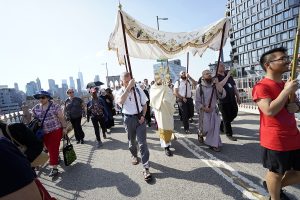BROOKLYN, N.Y. (OSV News) – Almost halfway across the Brooklyn Bridge toward Manhattan May 26, “amazing” was the only word Riya D’Souza-Pereira could come up with to describe the scene around her of the National Eucharistic Pilgrimage.
“I don’t have words to say, but it’s giving me goosebumps just that they’re coming there and we’re coming to meet our Lord over here and from here it goes ahead,” D’Souza-Pereira said. “It’s just amazing.”

D’Souza-Pereira was referring to hundreds of pilgrims from the Archdiocese of New York and Diocese of Brooklyn converging on the Brooklyn Bridge that afternoon, where New York Auxiliary Bishop Gerardo J. Colacicco and Bishop Robert J. Brennan of Brooklyn met for benediction before Eucharist continued in the monstrance into Brooklyn.
The major liturgical event was a high point for the National Eucharistic Pilgrimage, which launched the week before from California, Connecticut, Minnesota and Texas. Groups of young adults known as “perpetual pilgrims” walking the four routes with the Eucharist are tacking toward Indianapolis, where they will converge for the National Eucharistic Congress July 17-21.
The Memorial Day weekend included key highlights along all four routes. Before entering Brooklyn, pilgrims on the eastern route spent the weekend in other New York boroughs, with Masses, Eucharistic adoration, and processions through Central Park and Midtown Manhattan. On May 27, the perpetual pilgrims and their priest chaplains boarded a boat in New York Harbor with Cardinal Timothy M. Dolan of New York, who, from the water near the Statue of Liberty, gave benediction and blessed the city with the Eucharist before the pilgrims continued on to the Diocese of Metuchen, New Jersey.
“For Catholics, the Eucharist is the source and summit of our lives and I can’t think of a better way to bring that message to the world than something like this kind of display of solidarity, and faith, and conviction,” Joe Cerato, who participated in Brooklyn’s procession, told The Tablet, newspaper of the Diocese of Brooklyn. “I think it’s tremendous that we can be a part of what’s happening across the country.”
In St. Paul, Minnesota, an estimated 7,000 Catholics gathered for a 4.5-mile procession from the St. Paul Seminary along a historic avenue to the Cathedral of St. Paul. Despite predictions for thunderstorms, the sun shone as pilgrims pushed children in strollers and wagons while others in the procession rode wheelchairs or leaned on canes. Passersby knelt in reverence for the Eucharist or stared in awe at the massive crowd, which spanned several blocks of shoulder-to-shoulder pilgrims. The procession also included many priests, deacons, seminarians, and religious sisters and brothers.
Archbishop Bernard A. Hebda of St. Paul and Minneapolis led the procession with Auxiliary Bishops Michael J. Izen and Joseph A. Williams, who was recently named coadjutor bishop of Camden, New Jersey.
Also processing were retired Bishop Richard E. Pates of Des Moines, Iowa, and Bishop Andrew H. Cozzens of Crookston, a leader in the National Eucharistic Revival, first in a three-year role for the U.S. Conference of Catholic Bishops, and now as board chairman of National Eucharistic Congress, Inc. Bishop Cozzens oversaw the northern route’s launch May 19 at Itasca State Park, and he accompanied the pilgrims for several days their first week.
“Here we are so close to our God, filled with gratitude for the gift of the Eucharist, and really desiring that all would come to know the greatness, the closeness, the tenderness and the compassion of our God,” Bishop Cozzens said shortly before the procession began. “The Lord has accompanied us all these years, and today we are accompanying him. This pilgrimage reminds us that we are on our way with him to the Father’s house.”
On the pilgrimage’s southern route, pilgrims spent the weekend in the Diocese of Corpus Christi, Texas, named for the body and blood of Jesus, where Catholics joined a mile-long procession after Sunday Mass celebrated by Bishop W. Michael Mulvey at the Corpus Christi Cathedral May 26.
“It’s a reverent movement as Jesus is with us,” said Elizabeth Morales, the diocese’s social media coordinator, as she reported live from the procession. “It’s been a beautiful five days of faith and people witnessing to their love of Christ.”
On Memorial Day, the southern route’s perpetual pilgrims entered the Diocese of Victoria, Texas, spending the evening in praise and Eucharistic adoration at Presidio La Bahía, an historic Spanish colonial fort that played a significant role in the Texas Revolution.
After crossing from California into Nevada via a Eucharistic procession on Lake Tahoe May 24, perpetual pilgrims on the western route spent three days in the Diocese of Reno, with a Eucharistic procession following Sunday Mass celebrated by Bishop Daniel H. Mueggenborg at St. Thomas Aquinas Cathedral May 26. That afternoon, the pilgrims headed north to the Nevada-Oregon border town of McDermitt, where Bishop Liam S. Cary of Baker, Oregon, met them for a driving procession to Burns, Oregon, for dinner, faith-sharing and overnight adoration. Memorial Day included a series of driving processions across the state.
The perpetual pilgrims crossed in vehicles from Oregon into Idaho — with Bishop Cary leading the procession on a float, kneeling before the Blessed Sacrament — to meet Bishop Peter F. Christensen of Boise and hundreds of Catholics for a short time of Eucharistic adoration at Corpus Christi Church in Fruitland, Idaho.
Across the country in New York, as the eastern route’s entourage prepared to leave May 27, perpetual pilgrim and New York resident Marina Frattaroli stood in the rain at Pier Four in New York Harbor and, via social media, asked the Catholic faithful for prayers. “Please pray for us, for all of the seeds we just planted, all the fruit that’s going to come from our time in New York,” she said. “Pray for the revival, pray for the church, pray for us pilgrims.”
